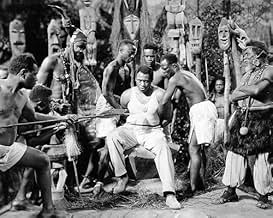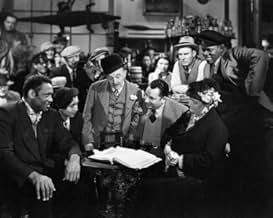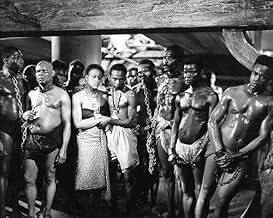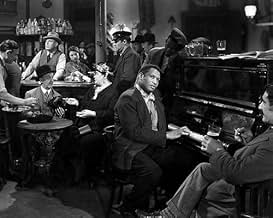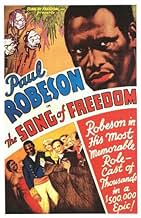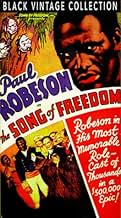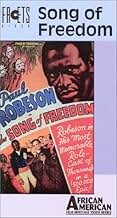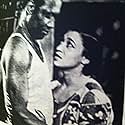A black British dockworker named Johnny Zinga becomes a famous singer and learns that he is the rightful king of the African island of Casanga.A black British dockworker named Johnny Zinga becomes a famous singer and learns that he is the rightful king of the African island of Casanga.A black British dockworker named Johnny Zinga becomes a famous singer and learns that he is the rightful king of the African island of Casanga.
Elisabeth Welch
- Ruth Zinga
- (as Elizabeth Welch)
Bernard Ansell
- Sir James Pyrie
- (as Bernerd Ansell)
Cornelia Smith
- Queen Zinga
- (as Miss C. Smith)
Sydney Benson
- Gate-Keeper
- (uncredited)
Cathleen Cavanagh
- Woman
- (uncredited)
Alf Goddard
- Alf, the Bartender
- (uncredited)
Featured reviews
This film made Paul Robeson proud, and it also garnered high approval from leading black intellectuals at the time, such as Langston Hughes. In its first half it's very easy to see why. The story is far-fetched, but it shows black people as regular folks amongst the working-class of London, without stereotypes, and the desire on the part of one of them (Robeson) to find out where his ancestors were from. In flashing through a couple of centuries, it also showed a sample of some of the horrors of slavery, and we see a clear link to how that caused Robeson's character to be tragically disconnected from his past.
Hearing Robeson perform six songs was quite a treat, and 5-stars on its own. The second, "Sleepy River," which we see with a montage of people listening to his wonderful voice at night, is particularly stirring. Meanwhile, Elisabeth Welch is such a cutey pie as his wife, and more importantly, she's also a real person and not some mammy/servant stereotype. We even get to hear her reprise the song "Sleepy River" at the end, which was wonderful.
The film falters a bit in its second half when Robeson's character makes his way back to his ancestral island, and discovers it run by superstitious, backward people. The characterization felt troublesome, particularly since Robeson seeks to improve their life with the advances he's learned growing up in a European culture, one the film shows to be superior in every respect. On the other hand, at least it's a black man who has come to do this, and a strong, talented, intelligent black man at that. There is something moving at the heart of wanting to find your ancestral land, and to help the people living there.
I might have knocked my rating down a bit because of the problematic bits, or because the interaction Robeson has with the Africans seemed so implausible, but I kept in mind the film was made in 1936. The contrast of Robeson and Welch's characters to what was being spewed out in Hollywood at the time for African-Americans is striking, and undeniable. I enjoyed watching them here, and for the film's musical numbers and the progress it represented, was glad I saw this.
Hearing Robeson perform six songs was quite a treat, and 5-stars on its own. The second, "Sleepy River," which we see with a montage of people listening to his wonderful voice at night, is particularly stirring. Meanwhile, Elisabeth Welch is such a cutey pie as his wife, and more importantly, she's also a real person and not some mammy/servant stereotype. We even get to hear her reprise the song "Sleepy River" at the end, which was wonderful.
The film falters a bit in its second half when Robeson's character makes his way back to his ancestral island, and discovers it run by superstitious, backward people. The characterization felt troublesome, particularly since Robeson seeks to improve their life with the advances he's learned growing up in a European culture, one the film shows to be superior in every respect. On the other hand, at least it's a black man who has come to do this, and a strong, talented, intelligent black man at that. There is something moving at the heart of wanting to find your ancestral land, and to help the people living there.
I might have knocked my rating down a bit because of the problematic bits, or because the interaction Robeson has with the Africans seemed so implausible, but I kept in mind the film was made in 1936. The contrast of Robeson and Welch's characters to what was being spewed out in Hollywood at the time for African-Americans is striking, and undeniable. I enjoyed watching them here, and for the film's musical numbers and the progress it represented, was glad I saw this.
This Hammer Studio, from London, England which is famous for its horror films surprised me with this great film from 1936 starring Paul Robeson, (John Zinga) who works as a London dock worker and sings songs all the time besides having a great bass voice for the opera and is discovered by a great opera director and producer from London, England. John is always wanting to go to Africa where he came from, but he does not know exactly where he was born, but he still remembers a song which he heard when he was very young. One day John happens to sing this song on stage in an opera performance and this song is recognized by an Englishman who tells him where it comes from and also a charm which John wears around his neck which helped determine its origin. John also has a wife and they both visit this Island and try to introduce themselves to these people and that is when the story gets very interesting. Don't miss this great film from the past, it is a gem in the rough. Enjoy
This was a fairly good film dating back to 1936 from Hammer Productions in Britain. Starring Paul Robeson, whose extraordinary vocal talents are properly utilized. It's the story of a African-Briton living in England after slavery has been abolished in the European nation. He works on the docks and his one dream in life to discover his ancestry in Africa. His interest is fueled by a song that he sings often, be it to his wife or during his job on the docks. A song that he never learned, but as he would put it, was always inside of him. His amazing bass singing voice is over-heard by a theater yuppie and he is quickly recruited to the stage appearing in theatrical productions while utilizing his singing talents. After creating a fan following and with the help of some knowledge from a theater-goer, he decides to finally take the trip to Africa to find his "roots." Overall, the film is good, if not a bit too idealistic. But it doesn't harm the film's integrity and Robeson's great talent as both an actor and singer. Seeing how this film is not known well, I would recommend it. It's not a very long picture; it runs just under and hour and twenty minutes. So take some the time, and find this movie. If not for the film, then do it for Robeson's incredible vocal talents.***
It's sad that this sort of film simply could not have been made in Paul Robeson's home country at the time due to racism. Instead, Robeson went to the UK and made a few films--too few. I say this because he had a wonderful screen presence and his singing was gorgeous.
Robeson plays 'John Zinga'--a London dockworker descended from royalty back in Africa. Oddly, he lacks a British accent (while Robeson was a brilliant and multi-talented man, apparently a British accent was beyond him) and he has a weird sort of consciousness of his people and Africa within him. It goes far deeper than his interest in his cultural homeland--Robeson's character is fixated on the place and seems to have bits and pieces in the back of his mind about his homeland--though no one apparently ever told him about this--at least as far as he can remember. So, after becoming a huge singing star and learning more about the exact place in Africa where his forebears came from, he takes off for the place to get in touch with his roots.
The second portion of the film takes place an Zananga, Africa. There, Robeson is eventually recognized as a descendant of kings and brings culture, medicine and western civilization to these people--but it is a hard fight to get them to abandon their ineffective ways. It's nice that it's NOT a case of whites bringing this to these 'dark' people but a black man bringing this knowledge to them--making it seem a little less paternalistic. In many ways, this portion of the film seems like a call to other black men and women to return and contribute to their ancestral lands.
Overall, while the film might seem a bit old fashioned today, it really is a remarkable film in many ways. The most obvious is because of its unusual subject mater, but more important aspects should not be lost on the viewer. To have a mainstream film starring a strong and talented black man was very progressive for its day. And, seeing Robeson liked and respected by all as a person--even by his white co-workers. In many ways the film comes off as a bit overly ideal--absent is racism and in this film a good black man can achieve practically anything--a message that must have resonated in the black communities in the UK as well as back home in the States. A daring film and a great chance to see and hear an amazingly gifted man. For more on this, read his biography on IMDb--you'll see what I mean.
Robeson plays 'John Zinga'--a London dockworker descended from royalty back in Africa. Oddly, he lacks a British accent (while Robeson was a brilliant and multi-talented man, apparently a British accent was beyond him) and he has a weird sort of consciousness of his people and Africa within him. It goes far deeper than his interest in his cultural homeland--Robeson's character is fixated on the place and seems to have bits and pieces in the back of his mind about his homeland--though no one apparently ever told him about this--at least as far as he can remember. So, after becoming a huge singing star and learning more about the exact place in Africa where his forebears came from, he takes off for the place to get in touch with his roots.
The second portion of the film takes place an Zananga, Africa. There, Robeson is eventually recognized as a descendant of kings and brings culture, medicine and western civilization to these people--but it is a hard fight to get them to abandon their ineffective ways. It's nice that it's NOT a case of whites bringing this to these 'dark' people but a black man bringing this knowledge to them--making it seem a little less paternalistic. In many ways, this portion of the film seems like a call to other black men and women to return and contribute to their ancestral lands.
Overall, while the film might seem a bit old fashioned today, it really is a remarkable film in many ways. The most obvious is because of its unusual subject mater, but more important aspects should not be lost on the viewer. To have a mainstream film starring a strong and talented black man was very progressive for its day. And, seeing Robeson liked and respected by all as a person--even by his white co-workers. In many ways the film comes off as a bit overly ideal--absent is racism and in this film a good black man can achieve practically anything--a message that must have resonated in the black communities in the UK as well as back home in the States. A daring film and a great chance to see and hear an amazingly gifted man. For more on this, read his biography on IMDb--you'll see what I mean.
If you can possibly see The Song Of Freedom by all means do so. It's a chance to see Paul Robeson sing and give a fine acting performance in a story set partially in Africa. It's a mini-version of the famous American mini-series Roots. Paul in fact carries his roots with him both in a song that's been with him since birth and a medallion handed down to him from an ancestor who was sold into slavery and who was king of his people. That's all dealt with in a short prologue.
Fast forward to 1936 and Robeson is working on the London docks and also provides a bit of entertainment for his fellow stevedores. Impresario Esme Percy discovers him and turns Robeson into a concert/opera singer. But one night a backstage visitor tells Robeson that this melody which he has engraved in his soul is the chief's song from a particular tribe in Africa. Robeson and wife Elisabeth Welch go to that part of Africa where he attempts to reassert his royal prerogatives.
As a colonizing power in Africa, the British picked up knowledge about the place that Americans only gleaned from Edgar Rice Burroughs and other such pulp fiction authors. And in these years prior to World War II did film a lot of stories on location there such as The Four Feathers in the Sudan. Song Of Freedom was shot on location in Sierra Leone for the African part of the story. It's light years more real than anything you would get from Hollywood.
Incidentally the gambit of the 'lost song' may very well have been lifted from the Victor Herbert operetta Naughty Marietta. No matter, it's well done and provides Robeson with a number.
Elisabeth Welch who was a fine singer in her own right gets to do Sleepy Rivers. I wish she had been given more to do.
Seeing both Paul Robeson and a glimpse of the real Africa is a chance no one should pass up.
Fast forward to 1936 and Robeson is working on the London docks and also provides a bit of entertainment for his fellow stevedores. Impresario Esme Percy discovers him and turns Robeson into a concert/opera singer. But one night a backstage visitor tells Robeson that this melody which he has engraved in his soul is the chief's song from a particular tribe in Africa. Robeson and wife Elisabeth Welch go to that part of Africa where he attempts to reassert his royal prerogatives.
As a colonizing power in Africa, the British picked up knowledge about the place that Americans only gleaned from Edgar Rice Burroughs and other such pulp fiction authors. And in these years prior to World War II did film a lot of stories on location there such as The Four Feathers in the Sudan. Song Of Freedom was shot on location in Sierra Leone for the African part of the story. It's light years more real than anything you would get from Hollywood.
Incidentally the gambit of the 'lost song' may very well have been lifted from the Victor Herbert operetta Naughty Marietta. No matter, it's well done and provides Robeson with a number.
Elisabeth Welch who was a fine singer in her own right gets to do Sleepy Rivers. I wish she had been given more to do.
Seeing both Paul Robeson and a glimpse of the real Africa is a chance no one should pass up.
Did you know
- TriviaPaul Robeson performs a scene from Louis Gruenberg's operatic version of "The Emperor Jones". He earlier had starred in Eugene O'Neill's original play on Broadway (1923) and in the film version The Emperor Jones (1933).
- Quotes
Gabriel Donozetti: What's the matter the color of his skin, when he has color in his voice! Power! Beauty! I go fighting!
- ConnectionsFeatured in That's Black Entertainment (1990)
Details
- Release date
- Country of origin
- Languages
- Also known as
- Un trono por una canción
- Filming locations
- Production company
- See more company credits at IMDbPro
- Runtime
- 1h 20m(80 min)
- Color
- Aspect ratio
- 1.37 : 1
Contribute to this page
Suggest an edit or add missing content

